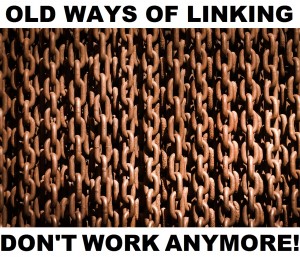 In the not too distant past, link building was a relatively easy thing to do. In the same way that you could get web pages to rank well by keyword stuffing, you could also strengthen your site’s link profile by submitting it to every web directory that you came across. Sometimes, it didn’t even matter what the directory was affiliated with. As long as you had a link back to your site, you were in a great spot.
In the not too distant past, link building was a relatively easy thing to do. In the same way that you could get web pages to rank well by keyword stuffing, you could also strengthen your site’s link profile by submitting it to every web directory that you came across. Sometimes, it didn’t even matter what the directory was affiliated with. As long as you had a link back to your site, you were in a great spot.
Flash forward to today’s internet, and there’s a much different story playing out. Search engines like Google prefer quality over quantity and reward sites that follow this lead. So, what constitutes a quality link and what makes a link not worth the submission time? Let’s take a look…
Over the past couple of years, Google updates have more or less nuked the various spam directories out there. Long gone are the days of submitting URLs in bulk, and so too are the benefits of those bulk submissions. The directories that have managed to survive managed to do so because they provided something of value for web searchers.
For example, a website like Avvo tends to rank well because it pulls information from state bar associations in order to create profiles on behalf of licensed attorneys. Of course, it’s then up to the attorneys to claim and update their profiles, but that’s a different conversation altogether. Regardless, Avvo gets its information from extremely credible sources and search engines recognize that.
Other directory sites pull their information from site aggregators (Acxiom, Localeze, Infogroup, and Factual being the major players). These aggregator sites have very strict criteria for how a company is able to get listed and even what edits the company is allowed to make. In all cases, these sites use several verification methods to determine whether or not the entity attempting to make edits to a listing is even affiliated with the company in question. For example, it may be necessary to submit copies of business licenses (with official company names) to the aggregator site before any sort of edits are allowed to be made. All in all, there’s so much red tape to cut through with these sites that it leaves little room for spammers to operate, thus why aggregator sites and the directories they supply are so trusted by major search engines.
Link exchange is another old method that no longer favors websites in need of a quick rankings boost. In this scenario, one website would reach out to another website, and the two sites would link back to each other’s respective sites. Because the links themselves were all that really mattered, sites that often had nothing to do with each other started linking to each other in order to scam search engines. Nowadays, links that don’t appear to be naturally/rightfully obtained are ignored, and websites that employ such tactics are often penalized (that’s what Google’s Penguin update was all about).
So, how do you get links to higher value sites these days? Simple – have awesome content that people want to link to because it’s informative. Put the time in to create content that is not only informative and easy to read, but clearly shows that you’re an authority in your respective field. This is the type of content that higher authority sites WANT to link to and that Google ultimately rewards.
If your law firm is involved in the community, it may be possible to get links from local news sources, and Google LOVES seeing this as well. It reinforces the fact that your law firm is a local business, and can have positive repercussions on both your local search presence as well.
All in all, Google wants to reward real businesses with higher search rankings, both organically and locally. This means that companies looking for a quick jump in search results via linking are about five years too late to the party. Quick and easy has been replaced with hard work and perseverance, and to go about building your online search presence in any other fashion will not only lead to lower rankings, but it may lead to site penalties as well.
To learn more about white hat link building, be sure to check out Part 2 next week!
Have your own opinions about link building? Share your thoughts with us in the comments…
Categories:
- Ask SLS
- Bail Bonds
- Client-Focused Strategy
- Community
- Google My Business
- Google Updates
- Holidays and Other Fun Stuff
- Law Firm Management
- Legal Online Marketing
- Local Search
- Marketing Tips
- Ms. White Hat’s SEO Corner
- Online Brand Development
- Online Content Development
- Online Review Sites
- Search Engine Optimization
- SLS News
- Social Media Marketing
- Video Marketing
- Website Design